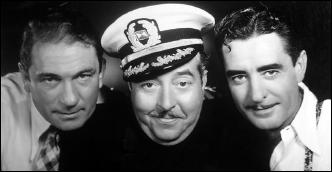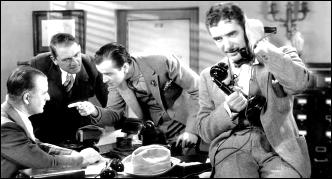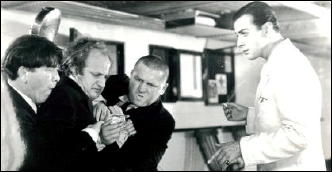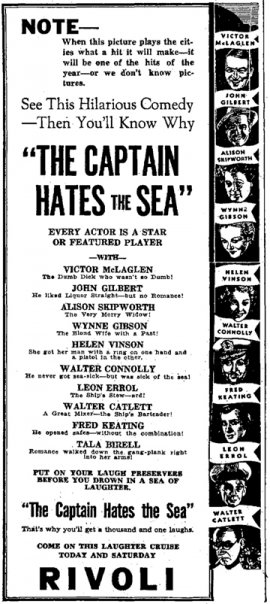Wed 22 Aug 2012
Reviewed by Dan Stumpf: WALLACE SMITH – The Captain Hates the Sea (Book & Film).
Posted by Steve under Films: Comedy/Musicals , Reviews[23] Comments
WALLACE SMITH – The Captain Hates the Sea. Covici-Friede, hardcover, 1933. Film: Columbia, 1934. Victor McLaglen, Wynne Gibson, Alison Skipworth, John Gilbert, Helen Vinson, Fred Keating, Leon Errol, Walter Connolly, Walter Catlett, Donald Meek, The Three Stooges. Screenplay: Wallace Smith, based on his book of the same title. Director: Lewis Milestone.

I can’t find out much about Wallace Smith except that he might have been a newsman in Chicago back in the 1920s — that heady Front Page era — before he graduated to novels and thence to Hollywood where he did about a dozen screenplays, including an adaptation of his own 1933 novel The Captain Hates the Sea, and it was seeing this film that prompted me to seek out the book.
Well, the novel is a pretty fine job. Smith, obviously day-dreaming in the third-person, spins a tale of an alcoholic Hollywood writer who breaks off a doomed relationship with a movie actress to take passage on a ship bound from California to New York, telling himself he’s going to sober up and write that novel he’s been putting off.

Also on board are a thief and his moll on the lam with stolen security bonds, a dumb (or is he?) cop who falls for the moll, a reformed floozie and her jealous husband, plus assorted side characters, some colorful and some merely backdrops, but all well thought out. And oh yes, they’re joined halfway through the trip by a hooker who got run out of Panama and seems to be channeling Miss Sadie Thompson.
With characters like this you wouldn’t need much of a plot, but Smith provides a witty, fast-moving thing, with the stolen bonds turning up yon and hither, a couple of affairs, deceit and treachery, fire in the hold, storm at sea and a suicide. All told with a pleasantly sardonic air that somehow keeps from sounding too snide or too pat. In fact, it’s just right, and I’m going to seek out more by this elusive author.
https://www.youtube.com/watch?v=bCVB_w-TVdU
The film Columbia made of this in 1934 was directed by none other than Lewis Milestone, legendary director of Of Mice and Men, All Quiet on the Western Front and Ocean’s Eleven, who handled it with the hip wit and snappy pacing typical of 1930s films.
Adapting his book, Smith did a good job of paring the tale down to its essentials and softening it up just enough to keep the censors mollified without losing the sadder-but-wiser touch he did so well.

This being a Columbia picture, Director Milestone had to settle for second-string actors — the ship’s band is portrayed by the Three Stooges — but he picked his cast well, with Victor McLaglen outstanding as the dumb cop, Helen Vinson and Fred Keating very smart and sexy and as the thieves, Leon Errol as a comic steward, and especially John Gilbert, that tragic one-time star now on the skids, perfectly cast as the boozy writer.
Looking at him here, suave and virile, one wonders how Gilbert might have fared had Louis B. Mayer not elected to destroy his career, but we’ll never know; this was his last film. I should also throw a kudo to Walter Connolly as the eponymous Captain, radiating quiet (and quite funny) desperation, dealing out lines like “I feel sorry for the sheep-headed woman or child that tries to get into the very first lifeboat ahead of me!” and generally imparting an air of comic authority to the whole thing. Definitely one to catch.
Editorial Comments: The video clip shows the first ten minutes of the film, but for some reason we don’t get to see the full screen. A big chunk of the left side is missing. And even though the clip says it’s part 1 of 7, those leaving comments say that part 8 has never been posted.
The book is not included in Hubin, and the film is categorized on IMDB as a comedy, which is how I’ve tagged it, but there appears to be enough criminous content for Al to include it. (There are two other books by Wallace Smith included in Crime Fiction IV, one marginally.)

August 22nd, 2012 at 7:55 pm
Two thoughts:
1. Columbia had an arsenal of top talent available if not under contract, including Milestone, Capra, Ford, Howard Hawks, Cary Grant, Jean ARthur, Edward G. and I am only suggesting peopole of the thirties. Into the forties and fifties, they were anyone’s equal.
2. John Gilbert was a hopeless alcoholic who died at thirty-five. Louis B. Mayer did not ruin anything. This guy did himself in. The popularity of attacking executives for the flaws or missteps of talent is hysterically off base.
August 22nd, 2012 at 8:45 pm
Agreed on Columbia. As I’m sure I’ve said before in the comments section of various posts, when I was a kid, seeing the Columbia lady logo at the beginning of a picture meant that it was going to be a good one.
I’m not so sure about Mayer not having a role in Gilbert’s decline. Certainly the general consensus is that he did, but the general consensus can just as certainly be wrong.
But from what I know (which is very little) there isn’t anything in what’s commonly said about Mayer and Gilbert that couldn’t have happened. I’ll keep an open mind about it, but if studio heads could make careers, they could just as easily break them.
August 22nd, 2012 at 9:05 pm
Steve,
Make or break, they are paying him $250,000.00 1930’s dollars per picture. Mayer may not have been a nice guy with him. So what. No one else at that studio had a problem of being thrown to the wolves, but thrown with golden gloves. Veronica Lake also went down the tubes. Same reason. Add Linda Darnell and Errol Flynn. They are their own authors.
August 22nd, 2012 at 9:49 pm
Further to Captain Hates The Sea:
I have just ordered a copy of Wallace Smith’s novel from Amazon. The review makes it seem like a lot of fun.
August 22nd, 2012 at 10:57 pm
I hadn’t looked on Amazon for a copy of the book yet. I did see one on ABE which I thought of snapping up, but on second thought I decided the price was more than I wanted to pay. I’m a little (well, a lot) more likely to see if a DVD of the film turns up the next time I go looking. Which I think I shall, right now.
August 23rd, 2012 at 10:19 am
The reviews for this film should be looked at. I mean of the period. New York Times, Variety. More current are Maltin’s comments. And others. This is not a success.
August 23rd, 2012 at 11:09 am
Sometime around 1968, Moe Howard appeared on The Merv Griffin Show, then originating in New York.
Moe came on stage with a photograph of himself with the other Stooges taken during this film’s production, which he “wanted to show to Pip (Arthur Treacher, also in the photo)”, whom he’d known for years.
While on the show, Moe told the story of how The Captain Hates The Sea went over schedule and budget, causing Columbia brass to wire Lewis Milestone on location to complain “The cost is staggering!”
Milestone wired back: “So is the cast.”
Run down the names on that cast list: John Gilbert wasn’t the only notable carouser on that picture.
As to Barry Lane’s other comments:
Golden-Age Hollywood was one of the grudge capitals of the world.
If you wanted to survive, there were certain people that you had to stay in their good graces: powerful studio bosses like Louis B. Mayer topped that list.
John Gilbert’s alcoholism was far from uncommon in post-Prohibition Hollywood. For every Gilbert there were many more performers just as addicted to booze whose careers were protected by Mayer and others like him – if you were successful or popular enough, a studio “fixer” would make the scandal go away; if you had somehow offended “the Great and Powerful Oz”, the protection wouldn’t be there any more.
If you know that history, later events such as the anti-Communist blacklist (of which Mayer was a major supporter) don’t seem as much of a surprise.
August 23rd, 2012 at 11:38 am
Mike,
I could not disagree more.
Re Gilbert: He was in some excellent films. Phantom of Paris, Downstairs, which he wrote. Hardly in the studio’s bad grace, no matter his relationship with Mayer.
Re The blacklist. Not a good thing, but certainly not applied to liberals, social democrats or progressives. These were almost, and there were errors, applicable to those who signed on the Stalinist propaganda. Stalinsim can easily be equated with the Hitlerian period, with this one exception. Stalin far more successful.
August 23rd, 2012 at 11:44 am
Further to the above:
One always has to be on his employers good side.
August 23rd, 2012 at 1:09 pm
Following up on my Comment #5, I found an online seller who has the movie on DVD, and not too expensively. (Around $5 if purchased as part of a lot of five or more.)
Barry, in Comment #6. No, I haven’t checked out contemporaneous reviews, nor even present-day comments on IMDB. You have me curious. I’ll see what other opinions turn up, other than the one by Dan, who makes it sound like a lot of fun.
August 23rd, 2012 at 1:16 pm
Steve,
Dan does make it sound like fun, and so do some of ther other reviews. The negative are seriously so. Check out the Times.
August 23rd, 2012 at 1:35 pm
Here’s a link to the NY TIMES review, which begins thusly:
“Something went agley with “The Captain Hates the Sea,” which opened at the Rialto last night. Decidedly, something went agley. For it had a workable story, a good cast, a fine director and all the technical skill that the Columbia studio could contribute. Yet the final result, as set before its audience last night, is an indefinite, round-about and generally meaningless production. About the only item that stands out is Walter Connolly’s performance as the irascible skipper who hates the sea for the passengers he must carry.”
http://movies.nytimes.com/movie/review?res=9506E5DB1238E13ABC4151DFB767838F629EDE
(The link may not work if you’re not a TIMES subscriber.)
Some current reviews:
http://homepages.sover.net/~ozus/captainhatesthesea.htm
“A neglected gem (it bombed at its theater release), with a great ensemble cast carrying the episodic film (the many colorful character actors are a trip).”
From IMDB, where overall it gets 7.0 stars out of 10:
“However, John Gilbert, in his final film, is magnificent as the drunk. His voice has never been better and how ironic that this great star, whose career was supposedly ruined by his lousy speaking voice, turns in yet another terrific performance in a talkie. For anyone who has seen Gilbert in this film or Downstairs, Queen Christina, or The Phantom of Paris, you know that Gilbert had no voice problems.”
“It is the cast that redeems this picture from being a forgettable piece of mediocrity. All put in good performances – although I wasn’t sure what The Three Stooges were doing in the film!! Alison Skipworth is especially memorable as a rather flirtatious rich widow.
“But the film is made unforgettable by a magnificent performance from the great silent star John Gilbert, in his final film. Having fallen from super-stardom with the coming of sound, he had descended into alcoholism, and would die just two years after this film was completed. Ironically he portrays an alcoholic trying to reform – and he plays it with such dignity, grace, charm and wit, that he makes us realise today what a great screen actor we lost in John Gilbert. A sad final role perhaps, but he at last proved to the world that he could have been a fine talkie actor.”
“To sum up, this movie as a whole does not work — normally I would rate it a five out of ten, as another mediocre, derivative work. But the talent on display makes it substantially better than average.”
“Some have called this a take on the “Grand Hotel” formula, but it isn’t sewed together quite that neatly. Also, note that although this film is clearly past the precode era it has plenty of precode devices oddly left in. Although this movie was thoroughly entertaining, Gilbert’s performance haunted me not only because of what he was playing – an unrepentant alcoholic – but how he played it. If you look at Gilbert’s past talkies he was thoroughly engaged in the parts he was playing. Here he seems tired and worn and just taking everything that he observes as a joke, as if nothing really matters to him at this point. Perhaps he was directed to play it that way, but it did make me sad. The ending did make me glad for Gilbert’s character, as there did seem to be at least one constant in his life upon which he could depend.”
“Today’s moviegoers would be somewhat put off by the cast of actors, who are familiar to us of a certain age but would be strangers to them. They may not have heard of John Gilbert, or Victor McLaglen, Helen Vinson, Leon Errol or the marvelous Alison Skipworth, for that matter. Add in the customs, styles and social disparities between now and then, and you have a filmed museum piece of interest to us older, savvy moviegoers only.”
“Most of the actors in this film are second-string actors or people like John Gilbert whose careers are in decline. That’s because this film was made by Columbia Pictures–either a very low-budget major studio or the best of the ‘Poverty Row’ film studios depending on your perspective. Columbia managed to create a lot of lower budget films during the 1930s and 40s and despite lower costs, the writing and acting tended to be pretty good.”
Whatever the facts are about Gilbert, it’s clear that the reason that the movie hasn’t been forgotten is that he was in it, and it was his final appearance on film.
August 23rd, 2012 at 1:45 pm
Barry–
After reading DARK STAR (written by Gilbert’s daughter, who may have had something of a bias in the matter) I wondered if Mayer really was detrermined to sink Gilbert’s career(supposedly for nearly marrying Garbo) so I went back & looked at some of Gilbert’s later films, and she’s right: they seem to have been re-edited to under-cut his acting. Likewise the sound equipment in his early talkies.
As far as the HUAC hearings and the blacklist, I’m not sure we have any common ground for discussion.
August 23rd, 2012 at 2:49 pm
Much of the little I know about Gilbert ‘s career and Mayer’s role in his downfall has come second-hand from DARK STAR. I didn’t bring it up earlier since, as Dan says, the author is Gilbert’s daughter, and she has all the right in the world to be biased about him. My sense has always been that there’s some truth in her account of the matter, but as far as I’m concerned, the case is far from closed.
As for HUAC and the blacklist, we’ve jumped the track a bit, since it has little to do with either John Gilbert or the movie at hand. If there’s discussion to be done, I imagine a more appropriate post will come along where it’s relevant.
August 23rd, 2012 at 10:37 pm
Man, I wish my late father was around for this discussion. But he died in 1995.
Bus Libott was the boom operator on this film.
The only things I remember about his reminiscences regarding it, is that:
1) it was the biggest collection of drunks he ever worked with; and
2) his heart went out to John Gilbert who was, according to my dad, the most tragic figure he ever worked with…
August 24th, 2012 at 1:02 am
Rick
What a wonderful connection you have to old movies like this! I’m sorry your father is no longer with us, but what great memories you must have. If you’d care to, tell us more about him. What other movies he worked on, what people he met.
And I can only assume you’re right about John Gilbert. Whatever the truth may have been, his was a sad end to a tragic life.
August 24th, 2012 at 11:58 am
Steve,
The truth is clearly out there. John Gilbert was a well paid, talented but hopeless alcoholic whose system cracked under the lifestyle strain. His daughter may write whatever she chooses, but she did not know her father. Leatrice wasa little girl when he died and for practical purposes never lived with him. As far as executive handling personnel with kid gloves, or not, why should they? Their jobs are on the line too. Spencer Tracy, who unlike Gilbert had some box office clout, was fired off Tribute To A Bad Man and replaced by James Cagney. It happens to people who cannot manage themselves. Blaming Mayer is ridiculous. Has nothing to do with whether one was a good guy and the other not. Merely, management.
August 24th, 2012 at 1:34 pm
Barry,
So what are you, married to Louis B. Mayer or something?
Ah, seriously though, you make some good points and it’s been an interesting discussion.
September 18th, 2012 at 8:14 pm
I’ve just run the picture. My feeling, it was fascinating and likable but missed all its beats. As I am about half way through Wallace Smith’s novel, which doesn’t miss a moment and is so far dead on with the picture. The culprit must be Lewis Milestone, who despite making many excellent films, missed the mark notably with Kangaroo and Ocean’s Eleven. Both of which I enjoyed.
I thought the production excellent and if Clark Gable had been the detective instead of McLaglen, or instead of anyone with a good part, it would have had the focus required. Gilbert is just fine in his supporting part. I think it clear that quite a few of the cast, and I don’t doubt crew, are just drunk out of their minds. With Gilbert it seems to show but is in character. I’ll see this again.
September 18th, 2012 at 9:08 pm
Some very interesting insights on the film, Barry. Thanks! What with my hospital stay and all, I never got around to getting my own copy. The nudge is appreciated!
October 6th, 2012 at 12:02 am
I’ve now seen the film twice. Once prior to reading the source material and once following. I enjoyed all three experiences, but the novel is more detailed and more controlled. It seemed fairly clear to me that the film was developed with a more or less strict adherence to the book. Some sequences are combines, as are characters, and that works well. Some scenes or events are simply alluded to and that throws continuity at least somewhat off. I can only guess that some scenes did not cut together effectively for reasons discussed in previous posts.
The playing is uniformly acceptable with several performances outstanding. This includes Gilbert who is great in his supporting part. The more I think about this the more I believe that his major stardom came quite by chance during the silent era, because this guy is not a star. Unfortunately or the opposite he was being paid as one. As a lead in second features and support in bigger projects he might, had he lived, found a niche as sort of a super Kent Taylor. In any case, it is all worth look at and having fun with.
September 4th, 2015 at 12:32 am
First of all, Lewis Milestone himself was a notorious drunk. He’s a major part of the problem with the Marlon Brando/Trevor Howard Mutiny on the Bounty. And the original Oceans 11 survives only on the stars – the direction is perfunctory at best. They hired him because they knew he’d be paralyzed most of the time.
Secondly, Barry Lane’s caustic defense of Louis B. Mayer is touching, but uninformed.
Gilbert and Garbo were on again/off again lovers for years. When she decided to marry someone else, Gilbert was distraught. When LB suggested to Gilbert to let her marry someone else and f*ck her on the side, Gilbert punched Mayer in the face.
At that point, Mayer decided to kill Gilbert’s career. Doug Shearer, head of sound at MGM, admitted much later that at Mayer’s direction, he went through Gilbert’s next picture and rolled off the bass response only on Gilbert’s lines, so his voice would sound thin and grotesque compared to all the others in a scene.
So sorry, Mr. Lane, your ideological defense of management falls apart. Gilbert may have been a drunk, but Mayer was much worse. Ultimately the system fired him from the studio he built himself. Couldn’t happen to a nicer guy.
April 4th, 2021 at 10:45 pm
Mr. Panskeptic:
The story about Garbo is nonsense. Moving right along, The enormous cast of leading players that stayed at MGM and embraced the studio is overwhelming, but include, Clark GAble, Spencer Tracy, Katharine Hepburn, Rober Taylor, Gene Kelly, Fred Astaire, Cyd Charisse, Mickey and Judy, Walter Pidgeon, Greer Garson, and many more.
Mayer was turfed out of the studio n 1951, nothing to do with anything other than changing times. And I am not defending him, I am explaining, impossible,over priced drunks are the people businesses of all kinds, get rid of.
Now people close to me, Cyd Charisse and Don Weis, both enjoyed their time at Metro and Cyd especially thought Mr. Mayer a good boss.
I know the deification of drunks and degenerates is the American way, but it does not always work out.